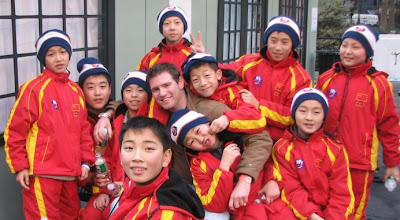My involvement in China through Project Hope
If you are interested in learning about my background with youth hockey development, in particular internationally, I would like to refer to you to Charles B. Wang Ice Hockey Project Hope (www.nyiprojecthope.com). I had the distinct pleasure of going to China with Angela Ruggiero (www.angelruggiero.com), 3-time Olympian for Team USA in hockey, former Apprentice (season 6) contestant, and all around amazing person. Together we visited the schools in Heilongjiang Province that we were providing hockey resources to. Here is our recap from the Project Hope website. Be sure to visit nyiprojecthope.com & browse around to get a clear understanding of how much hockey can improve a kids life! I hope after seeing some pictures and reading the messages from the kids, you will be interested in donating to my cause for kids in Ladakh to have a similar experience!
Project Hope Journal 1/22/07
By Angela and Adam
We're back from China, and after almost two weeks, what we miss the most is the hospitality. Everywhere we went (all 8 schools), we were greeted with open arms, by local and school officials, and many students that were supposed to be on winter break (but came back just to see us and spend some time on the ice). The outdoor rinks have become a center to the respective communities, and the kids in our Project Hope schools, (elementary school age) skate over 5 days a week! Their smiles on the ice made it easy to ignore that it was as cold and windy as the Great Lakes region. We took them through some basic skating and puck handling drills, and then we got into the fun, reminding everyone (including the adults standing around the rinks) that hockey, above all else, is fun.
Other than skating with the Project Hope students, we also had the opportunity to scout our prospective scholarship candidates in Harbin and Qiqihar. Twenty (about ten in each city) of the best teenage boys and girls skated their hearts out for over an hour, in an intense tryout. Not only were their hockey skills put to the test (and a fair amount of stamina testing to go along with it), but an interview was conducted in English to determine whether they were ready to study at a school for a full academic year. While their hockey skills were impressive, it was clear that everyone needed more work on English. Before anyone spends a full year in America, we'll bring over a few students for the summer in an intensive ESL program, allowing them to experience the United States first hand. The opportunity to play hockey will also be important, and the students will be able to put many hours of hard work on the ice, after they do so on paper.
In our meetings with local officials, it became clear how important Project Hope has become to the lives of so many people. In some cases, over 100 students get the opportunity to learn hockey at their school. Hockey has become a class worth academic credit, and in the best of scenarios, Project Hope hockey players have been given a clear path to success. In Qiqihar, a memo was issued on behalf of the Sports and Education Bureaus, mandating that a specific system be implemented to assist these scholar athletes any way possible. We hope that the civic governments in each area, along with the Project Hope schools, can follow suit, allowing more students the opportunity to play hockey, study English five days a week, and continue to receive the funding and support of their local governments.
Whether it was the center city of Harbin, Jiamusi and Qiqihar, or a surrounding town, each community had a unique culture. The sense of family and community dominates the social character and culture, and the group lunches and dinners gave us the opportunity to become members of the community. We spent a lot of time getting to know everyone personally (through a translator, of course), and found that while our cultures are as different as can be, there are some things that we all share in common. First, and most obvious, we're all human. Sometimes, we forget what that means, but it's important. Whether you live on Long Island or in Heilongjiang, everybody wishes to be happy and successful (culturally subjective), have a long life, and wish the same for our children. Going beyond that, we all love hockey. One of the many goals of Project Hope is to cross borders using hockey as the international language. It is a sport unlike anything in the world, requiring a whole new sense of transportation just to be able to communicate. As hockey history has proven, any team can be superior once the puck drops, as long as there is a balance of talent, discipline, structure, creativity and fun. This understanding of hockey is universal, and if it ever becomes less, it will no longer be hockey.
The success lies, though, on everyone involved in Project Hope. We will continue to build rinks and provide as much equipment as possible, but at the same time, we're requesting that anyone willing to help makes a donation or other contributions in support. There is information on the web page specifying how YOU can help.
Stay tuned for more news on Project Hope. We have an exciting future and many more plans. The next invitational is scheduled for January 17-18, 2008. ANY teams interested should fill out our form. Maybe we'll even sponsor a team to compete in China. Start working on your Chinese.





